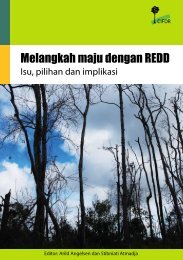Adaptive collaborative management of community forests in Asia ...
Adaptive collaborative management of community forests in Asia ...
Adaptive collaborative management of community forests in Asia ...
You also want an ePaper? Increase the reach of your titles
YUMPU automatically turns print PDFs into web optimized ePapers that Google loves.
Chapter 5: Muddl<strong>in</strong>g Towards Cooperation <strong>in</strong> Mal<strong>in</strong>au • 147<br />
the <strong>in</strong>ertia <strong>of</strong> ‘feel<strong>in</strong>g good about each other’, which bl<strong>in</strong>ds everyone to the<br />
lack <strong>of</strong> effective action. It also means that the group with the most power<br />
can control the agenda at the likely cost <strong>of</strong> benefits to more marg<strong>in</strong>alised<br />
groups. Under the New Order <strong>of</strong> Soeharto, central government controlled<br />
the agenda but was too remote to understand communities’ needs. Now<br />
district governments are seek<strong>in</strong>g to control the agenda but have little<br />
capacity or flexibility to address communities’ priorities except where there<br />
are co<strong>in</strong>cidental convergences <strong>of</strong> <strong>in</strong>terests.<br />
Our conclusion is that empower<strong>in</strong>g marg<strong>in</strong>alised groups requires a<br />
strategy for secur<strong>in</strong>g the long-term support <strong>of</strong> controll<strong>in</strong>g authorities while<br />
creat<strong>in</strong>g the space to work with different entities with<strong>in</strong> that authority<br />
and <strong>in</strong>dependently <strong>in</strong> the short term. It may also require constructive<br />
confrontation rather than collaboration, as long as that confrontation does<br />
not backfire and hurt the groups it <strong>in</strong>tended to benefit. Underly<strong>in</strong>g either<br />
approach is the need for political sensitivity and savvy to understand and<br />
work with local power relations constructively (Forester 1989). We feel<br />
strongly that collaboration needs to be pursued as a means, not as an end <strong>in</strong><br />
itself. In this current phase we are mov<strong>in</strong>g cautiously forward with programs<br />
that we hope will better complement government yet not be dependent on<br />
their actions. We seek a less proactive role and rely more on co<strong>in</strong>cidental<br />
convergences <strong>of</strong> <strong>in</strong>terests.<br />
Ironically, tak<strong>in</strong>g this role allowed us to appreciate more fully the exist<strong>in</strong>g<br />
spontaneous order <strong>of</strong> cooperation and how to work with<strong>in</strong> it. With such an<br />
uneven and complex set <strong>of</strong> relationships, <strong>in</strong>terdependencies among groups<br />
become problematic. Achiev<strong>in</strong>g any k<strong>in</strong>d <strong>of</strong> direct coord<strong>in</strong>ated action<br />
(beyond organis<strong>in</strong>g s<strong>in</strong>gle events) becomes difficult, even with patience,<br />
a will<strong>in</strong>gness to compromise and a reasonable budget. It is not clear that<br />
these diverse groups are will<strong>in</strong>g or able to solve their problems themselves,<br />
even with facilitation (Hagmann 1999).<br />
Under such complex circumstances, each group needs space to manoeuvre<br />
<strong>in</strong>dependently. Cooperation occurs as a spontaneous order (diZerega 2000)<br />
<strong>in</strong> which participants pursue their own ends and mutually adjust to one<br />
another; it is polycentric, rather than guided by a s<strong>in</strong>gle organisation. In<br />
spontaneously organised cooperation, competition can exist and even<br />
promote more rigorous outcomes than it would <strong>in</strong> the self-organised orders<br />
<strong>of</strong> science, markets or democracy (diZerega 2000). Spontaneous orders<br />
can <strong>in</strong>corporate more complex relationships and <strong>in</strong>formation because they
















